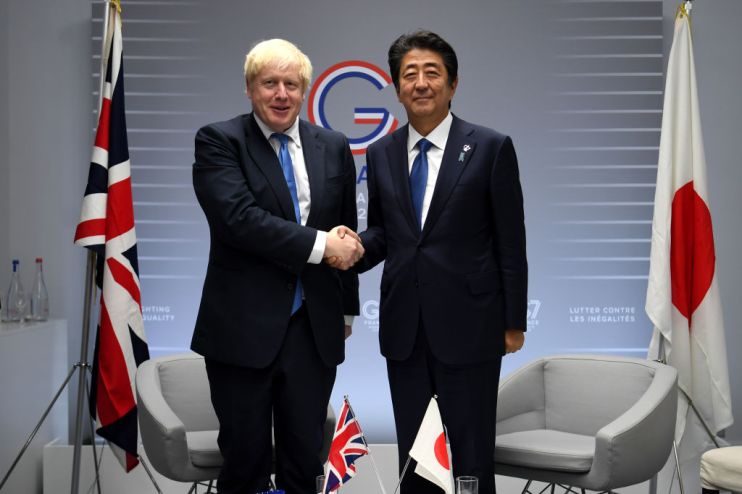A trade deal with Japan flickers on the horizon

Time is running out to put the finishing touches on the highly anticipated UK-Japan Free Trade Agreement (FTA), among the most important of the UK’s trade treaties in the new post-Brexit era.
If one is looking for a way to capture the spirit of global Britain, surely this is it. Japan is the UK’s fourth largest non-EU export market, and eleventh globally, accounting for more than two per cent of Britain’s total exports.
The UK’s approach to the Japan FTA is based on improving upon the EU-Japan Economic Partnership (JEPA), concluded in 2019 and currently covering Britain until the end of the transition period. While much of the attention in trade negotiations tends to focus on removing tariff barriers for goods, it is important to realise that almost half of the £29.5bn annual trade between the two countries is in services, where the UK excels.
Consequently, the UK is seeking to expand upon that agreement’s rather weak coverage of its vitally important services sector, as the EU and Japan were primarily interested in reducing tariffs on agriculture and manufacturing.
The UK rightly seeks the inclusion of extensive commitments on digital trade, including supporting the free flow of data between Japan and the UK with a view to supporting the development of emerging technologies such as blockchain, driverless cars, and quantum computing. Although Japan is relatively more open to foreign trade in digitally traded services than many other developed countries, it still maintains material restrictions on communication infrastructures and connectivity, such as on cross-border data flows and electronic transactions.
The UK also wants ambitious coverage of professional and business services, including the recognition of professional qualifications for the providers of legal services, where the UK is a world-leader. Since many Japanese sectors are effectively open to foreign providers already, the negotiations will concentrate on practical barriers such as licencing and qualification requirements.
Negotiations on these issues tend to be time-consuming because they cannot be done without the participation of domestic regulatory authorities. Some have mistakenly warned that Japan would be compelled to grant preferential treatment in this area retroactively to the EU because of the Most Favoured Nation (MFN) obligation in the JEPA, which would cause it to be cautious with the UK. However, the MFN provision in the JEPA specifically precludes recognition for professional qualifications or licences extended in future FTAs, such as with the UK, meaning that Japan is free to offer better treatment to the UK with regards to services professionals than it did to the EU.
Crucially for the City, to be truly worthwhile the UK-Japan FTA must cover financial services — an area which the EU’s JEPA achieved little beyond what is available under WTO terms. While the UK already exports £4.1bn of financial services to Japan each year, the sector would benefit further from reduced barriers to cross-border trade and investment, as well as cooperation between the two countries on financial regulation.
However, it is not clear how much market access we can expect to achieve in financial services, a sector which has historically been unresponsive to extensive liberalisation through free trade agreements. It may end up that the agreement merely establishes a framework for further cooperation in this area, which could take time to generate concrete benefits.
Investment is another area where the UK-Japan FTA can go beyond the JEPA, the investment chapter of which lacks commitments on investment protection and dispute settlement. This omission was partly due to the EU’s focus on promoting its experimental investment court system, whereas Japan preferred traditional investment arbitration. The UK would be wise to accept the Japanese approach to this issue, with a view to crafting deeper commitments on investment protection as well as market access across sectors.
Such agreements take time to hammer out, but good news is that both sides are eager to conclude an agreement this summer, well ahead of the end of the transition period in December.
Some have suggested a phased arrangement consisting of an initial or interim agreement, perhaps based on a relatively straightforward roll-over of the JEPA, followed by a more comprehensive deal, including additional commitments on services next year.
However, any FTA which involves tariff concessions will need to be ratified by the Japanese parliament, and the Japanese understandably would rather not have to go through this process more than once. This means that there is every incentive for them to cover as much as possible in one agreement — and to do so soon to ensure business continuity as the UK emerges from the EU’s regulatory sphere.
The UK, meanwhile, is eager to score a major post-Brexit win to secure momentum in even bigger trade negotiations with the EU and the US. A quick agreement is in everyone’s interests — so expect to see progress before the summer’s out.
Main image credit: Getty
The Getty Image will be here
